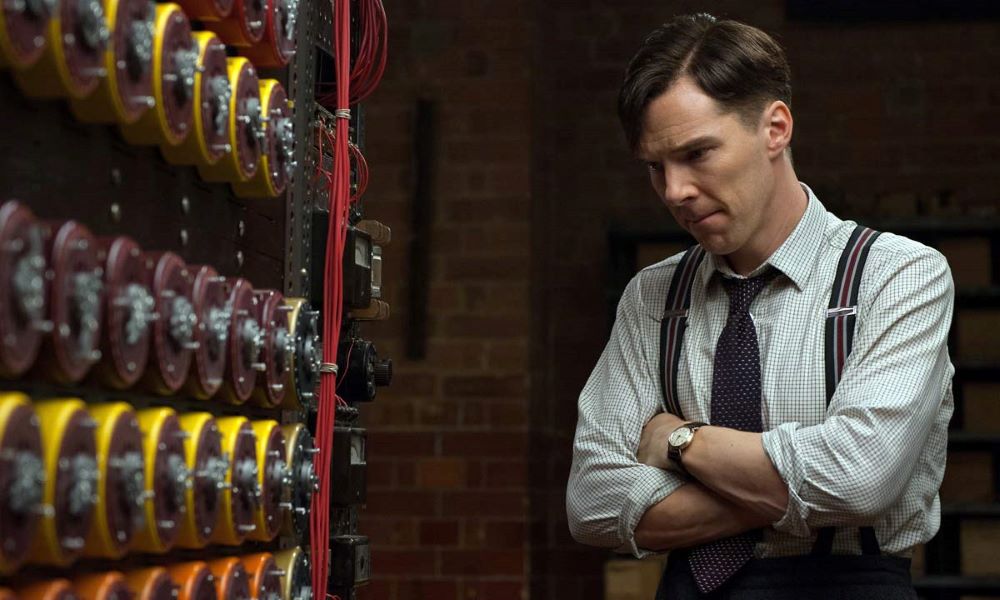
The Imitation Game
2014, PG-13, 114 min. Directed by Morten Tyldum. Starring Benedict Cumberbatch, Keira Knightley, Matthew Goode, Rory Kinnear, Charles Dance, Mark Strong, Allen Leech, Alex Lawther, Jack Bannon.
REVIEWED By Kimberley Jones, Fri., Dec. 26, 2014
Is The Imitation Game gay enough? That’s not a flippant question; I fretted it both times I watched the movie. Its subject, Alan Turing, was a pioneering figure in computer science who led the covert group at Bletchley Park that broke the Nazi Enigma code; many credit those cryptologists with winning the war. He was also a closeted homosexual, and was prosecuted for it in 1952, when it was still a criminal act to be gay in Great Britain. (Raise your hand if you know how many U.S. states still have anti-sodomy laws on the books.) Two years after Turing was sentenced to chemical castration, he died in 1954 from a cyanide-laced apple – presumed suicide. The Queen issued a posthumous pardon in 2013.
The Imitation Game, from director Morten Tyldum, doesn’t pretend Turing wasn’t gay; Graham Moore’s script weaves that fact into the film’s structure, which moves among three timelines. The film begins in 1951, when Turing is taken into police custody, shifts to 1940 for a boilerplate dramatization of England at war and under siege, then jumps back to the late Twenties, when Turing, brutishly bullied for being different, finds friendship and the first stirrings of something more with a classmate (they press knees and exchange encrypted notes of devotion). This early version of Turing is played by the perfectly cast Alex Lawther, all tremulousness and stomach butterflies. You want to bundle him on your lap and reassure him it’ll get better.
It does get better, in a way: He grows up to be Benedict Cumberbatch. The actor, probably still best known for playing Sherlock Holmes in the BBC series, has had a meteoric rise, and for good reason – he’s really good at what he does. Here, he does a lot with a little; it’s an underwritten part. Moore’s script boxes in the Bletchley-era Turing as a too literal genius who doesn’t get jokes and can’t read social cues. He’s an accidentally-on-purpose funny sort-of straight man, if you’ll pardon the pun, and the film is perpetually bemused by him.
Keira Knightley plays a fellow codebreaker named Joan, another brainy oddball who dials into the same scratchy radio frequency as Turing. Their sexless bond is believable, but the film’s emphasis on the relationship is belabored. Turing may say out loud he’s had affairs with men, but they’re never seen, and the film is more concerned with how he feels about Joan. It’s an easy place to foist some drama, sure. Still, what lingers is the feeling that the filmmakers may pay lip service to Turing’s sexuality, but they prefer to keep his sex life strictly theoretical. Careful, there: No tracking dirt on the nice clean prestige picture.
A note to readers: Bold and uncensored, The Austin Chronicle has been Austin’s independent news source for over 40 years, expressing the community’s political and environmental concerns and supporting its active cultural scene. Now more than ever, we need your support to continue supplying Austin with independent, free press. If real news is important to you, please consider making a donation of $5, $10 or whatever you can afford, to help keep our journalism on stands.
Kimberley Jones, June 1, 2012
April 19, 2024
April 19, 2024
The Imitation Game, Morten Tyldum, Benedict Cumberbatch, Keira Knightley, Matthew Goode, Rory Kinnear, Charles Dance, Mark Strong, Allen Leech, Alex Lawther, Jack Bannon









